外研版初二英语上册Module 11 Unit 2教案
外研八年级英语上册Module11 Unit2 课件(共21张PPT)
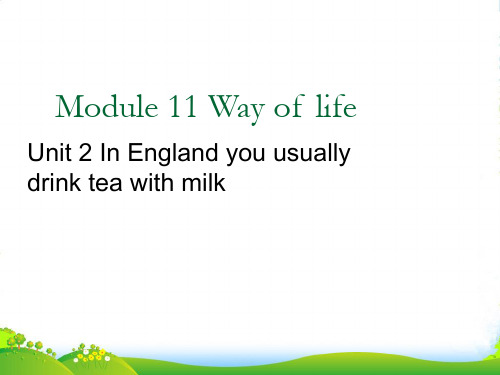
you can just use their first names. One day we visited some friends and had
afternoon tea together. Afternoon tea is not just a drink but a light meal at around 4 pm. We ate sandwiches and a large fruit cake. In England, you usually drink tea with milk. So I tried to drink tea with milk too.
/'ɒntə/ /'dʒentlmən/ /'ʃəʊldə/ /ɪk'spɪərɪəns/
到……之上; 向……之上 prep. 先生;男士 n. 肩;肩膀 n.
经验;经历 n.
onto
gentleman shoulder experience
Read My experience in England. Which sentences describe what you can see in the pictures in Activity 1?
6、does not mean teaching people to kow what they do not know ; it means teachng them to behave as they do not behave. 教育不在于使人知其所未知,而在于按其所未行而行。2021年11月2021/11/262021/11/262021/11/2611/26/2021 7、is a progressive discovery of our ignorance.教育是一个逐步发现自己无知的过程。2021/11/262021/11/26November 26, 2021 8、is a admirable thing, but it is well to remember from time to time that nothing worth knowing can be taught.教育 是令人羡慕的东西,但是要不时地记住:凡是值得知道的,没有一个是能够教会的。2021/11/262021/11/262021/11/262021/11/26
【(新版)外研版】八年级英语上册Module11Unit2InEnglandCyouusuallydrinkteawithmilk教案
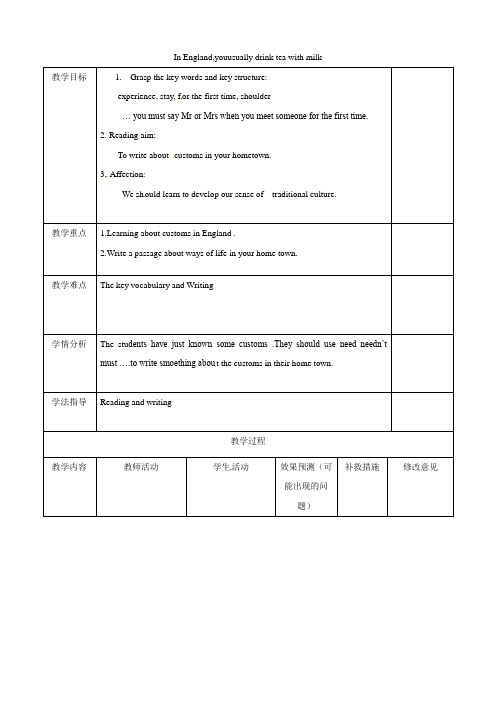
Let students do this and check the answers with whole class.
Get the students to read the questions through and make sure they understand them
InEngland,youusually drink tea with milk
教学目标
1.Grasp the key words and key structure:
experience, stay, f or the first time, shoulder
… you must say Mr or Mrs when you meet someone for the first time.
2.Write a passage about ways of life in your home town.
教学难点
The k
The students have just known some customs .They should use need needn’t must ….to write smoething abou t the customs in their home town.
2. Reading aim:
To write about customs in your hometown.
3 . Affection:
We sh ould learn to develop our sense of traditional culture.
外研版八年级英语上册教案 Module 11第二课时
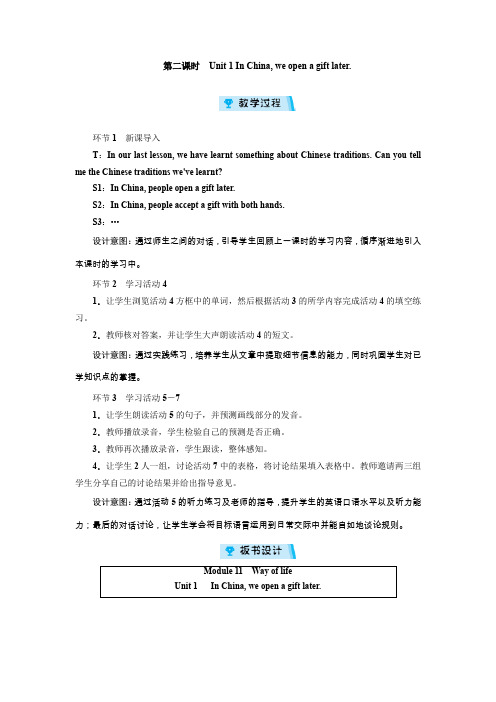
第二课时Unit 1 In China, we open a gift later.
环节1新课导入
T:In our last lesson, we have learnt something about Chinese traditions. Can you tell me the Chinese traditions we've learnt?
S1:In China, people open a gift later.
S2:In China, people accept a gift with both hands.
S3:…
设计意图:通过师生之间的对话,引导学生回顾上一课时的学习内容,循序渐进地引入本课时的学习中。
环节2学习活动4
1.让学生浏览活动4方框中的单词,然后根据活动3的所学内容完成活动4的填空练习。
2.教师核对答案,并让学生大声朗读活动4的短文。
设计意图:通过实践练习,培养学生从文章中提取细节信息的能力,同时巩固学生对已学知识点的掌握。
环节3学习活动5-7
1.让学生朗读活动5的句子,并预测画线部分的发音。
2.教师播放录音,学生检验自己的预测是否正确。
3.教师再次播放录音,学生跟读,整体感知。
4.让学生2人一组,讨论活动7中的表格,将讨论结果填入表格中。
教师邀请两三组学生分享自己的讨论结果并给出指导意见。
设计意图:通过活动5的听力练习及老师的指导,提升学生的英语口语水平以及听力能力;最后的对话讨论,让学生学会将目标语言运用到日常交际中并能自如地谈论规则。
请完成本课对应训练!。
外研版英语八年级上册Module 11 Unit 2课件
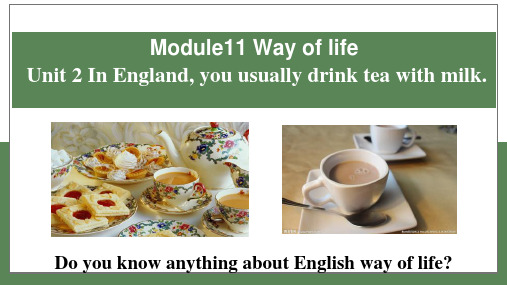
Step 6: Discuss
Back in China, the ways of life are different from the English ways of life.
tea time
greeting
visiting friends
Eating food
In England, they eat with_k_n_i_f_e_a_n_d__fo_r_k In China, we eat with_c_h_o_p_s_ti_c_k_s_a_n_d__s_p_oon
P90 The pictures below show two
1 examples. Work in pairs. Talk
_t_e_a_ with _m__i_lk_
when
food
drink
having afternoon tea
Afternoon tea is not just a drink but (also) a light meal at around 4
pm.
下午茶不仅仅是喝茶,而且是下午4点左右的一顿便餐。
P913Βιβλιοθήκη 1 When you are talking to your friends, you may
call them ____.
a) by their first names b) Mr or Mrs
2 When you are invited for afternoon tea, you
will have ____.
F_i_s_h_a_n_d__c_h_ip__s. You can eat it in the shops or _t_a_k_e_i_t_a_w_a_y__.
外研版八年级英语上册Module11 Unit2 课件

Sometimes people are slow to get
on the bus.
能力提升全练
Ⅴ.阅读理解
(人与社会·文化习俗)(2023吉林中考,★★☆)
①There are 56 ethnic (民族的) groups in China. Different ethnic groups have their own special cultures. Let’s enjoy some of them.
homes. At the festival, young men dress up like Manghao and
touch others to send good wishes.
21.Who uses tie-dye to dye clothes most? A
A.The Bai people.
Module 11 Way of life
Unit 2 In England, you usually drink tea with milk.
基础过关全练
Ⅰ.根据句意和汉语提示写出所缺的单词 1.(人与社会·游览体验)(2023广东佛山期末)I went to England last year and I had some interesting experiences (经历) there.
③The Mongolian people live in the Mongolian yurts (蒙古包). These yurts are large round tents and their tops look like umbrellas. They are the traditional homes of the Mongolian people. The yurts are usually white because they’re made of sheep’s wool. And white is a symbol of happiness.
外研版 八年级英语 上册Module 11 Unit 2课件
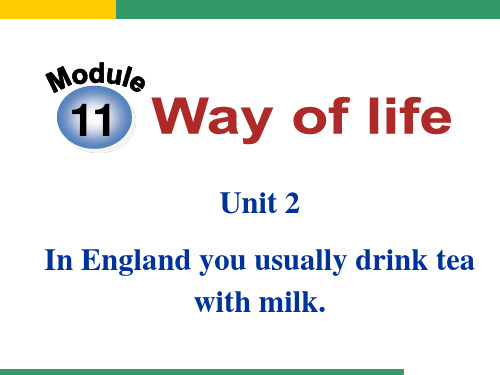
到……之上; 向……ຫໍສະໝຸດ 上 prep.先生;男士 n. 肩;肩膀 n.
onto
gentleman shoulder
1 Work in pairs. Look at the pictures and talk about what you can see.
2 Read My experience in England. Which sentences describe what you can see in the pictures in Activity 1?
3 Choose the correct answer.
1 When you are talking to your friends, you
may call them
.
√a) by their first names
b) Mr. or Mrs.
2 When you are invited for afternoon tea, you
My experience in England By Wang Hui
I went to England last year. I enjoyed my stay, and I noticed something interesting with the English way of life.
For example, you must say Mr. or Mrs. when you meet someone for the first time. When you get to know each other better or when they ask you to,
•
14、抱最大的希望,作最大的努力。 2021 年5月1 0日星 期一202 1/5/1 02021 /5/10 2021/ 5/10
外研版八年级英语上册课件 Module11 Unit2
get on a bus
In picture 1, two women are sitting at the table. They are drinking tea and eating cakes and biscuits.
In picture 2, people are trying to get on a bus.
push one's way意为“推挤着去...” lose one's way迷路 make one's way 行进
6 You need to wait your turn.
wait one's turn意为“等着轮到某人 ”,turn在此处作名词,意为“次序,顺序”
notice sb do sth 注意某人做了某事
A experiences B experience
C service
D art
2 I enjoyed my stay...
stay作名词,意为“逗留,停留” {拓展}(1) stay作动词,意为待
I will stay in London for two weeks. (2) stay作连系动词,意为“保持”后接 形容词作表语
I noticed Tony buy a cake. notice sb doing sth 注意到某人正在 做某事
I notice Tony buying a cake.
1 You needn't wash all the clothes.(改为同义 句
You___ ___ ___wash all the clothes. 2 I don‘t know how I can get to the bank.(改 为同义句)
外研八年级英语上册Module 11 Unit 2 课件(共31张PPT)
3. What food and drink do you give to visitors when they come to your home? We will serve the visitors with tea, fruits and snacks.
Reading
1. When do people have afternoon tea in Britain? At around 4 p.m.
2. What is the traditional food in England? Fish and chips.
1. When you are talking to your friends, you
因此在英国,外卖食品被称为 “takeaway” e.g. The restaurant provides takeaway
service. 这个饭店提供外卖服务。
4. Once I noticed a gentleman touch a
young man on the shoulder… touch sb. on the should 表示“拍某人 的肩膀”,是英语的惯用表达,其他 类似的表达例子如: pat sb. on the head 拍某人的头 kick sb. in the leg 踢某人的腿
3. … or you can take it away and eat it with your fingers! take away在这里特指将餐馆的食品带 走,而不是在餐馆食用。
外研版八年级英语上册Module11 Unit 2 课件
本模块重 点语法
情态动词+动词原形
Unit2 In England, you usually drink tea with milk.
My experiences in England
By Wang Hui
A.How to address people B.Afternoon tea C.What to do at a bus stop
D.Traditional food
E.The English way of life
Para graph 2
Scanning
Para graph 3
Write a passage about way of life in your hometown.
10个全对加3分,对9个加2分,对8个加1分
A. At around 2 pm. B.At around 3pm.
C. At around 4 pm. D. At around 5 pm. ( )4. What is the traditional food in England?
A.Fish and chips. B. Tea with milk. C.Fish and tomatoes. D. Hamburgers.
• For example, you must say Mr or Mrs when you meet someone
• for the first time.
•
3. What do you eat for afternoon tea?
新外研版八年级英语上册Module 11 Unit 2教学课件
2. we usually don’t pay much attention to that. 我们通常不太重视那个。 pay attention to 注意;专心;集中注意力。 同义表达:take care of, be careful e.g. I never seem to be able to pay attention to our teacher. 我似乎向来就没法去注意我们的老师。 We've got to take care of him. 我们说好要照顾他的。 His mother told him to be careful again and again. 他的妈妈一再告诉他要细心。
1. What did Wang Hui notice when he was in England? He noticed something interesting when he was in England.
2. What is one example of the English way of life? For example, you must say Mr or Mrs when you meet someone for the first time.
3. What do you eat for afternoon tea?
You can eat sandwiches or a large fruit cake, and drink tea with milk.
4. How can you eat fish and chips? You can eat fish and chips in shopea in England, it will usually contain . b) sugar .
- 1、下载文档前请自行甄别文档内容的完整性,平台不提供额外的编辑、内容补充、找答案等附加服务。
- 2、"仅部分预览"的文档,不可在线预览部分如存在完整性等问题,可反馈申请退款(可完整预览的文档不适用该条件!)。
- 3、如文档侵犯您的权益,请联系客服反馈,我们会尽快为您处理(人工客服工作时间:9:00-18:30)。
Unit 2 Reading and writingTarget language 目标语言1. Words & phrases生词和短语experience, sandwich, shoulder2. Key sentences重点句子You’d better not cut your hair during the Spring Festival month.You must say Mr. and Mrs. when you meet someone for the first time.You can just use their first names.You can buy it and eat it in special fish…You can take it away and eat it with your finger!At the bus stop you must not push your way onto the bus.You need to stand in a line behind the other people and wait your turn.Ability goals 能力目标Enable students to read and write a passage about traditional life in China.Teaching important/difficult points 教学重难点How to use must, mustn’t, can and can’t.Teaching methods教学方法Task-based learning.Teaching aids教具准备A projector or some pictures and some small pieces of paper, a tape recorderTeaching procedures and ways教学过程与方式Step I Revision and lead-inIn this procedure, ask students to talk about the pictures in activity 1.T: As we know, the custom and traditional life is different in different countries. Now please look at the pictures in activity 1. What can you see? What are the people doing?Ask the students to say the words and write them down.S: In picture 1, there are two people standing around the table. They are having afternoon tea.S: In picture 2, there are two man at the bus stop. They are standing in a line.Then ask them to work in pairs and talk about some actions. What must we do? What mustn’t we do? Can you give some advice? Let’s have a discussion before re ading the passage.Sample:S: When you greet people, you should first say hello to them and then shake hands with them. But don’t kiss when you are in England.S: When we have a tea party in China, we can talk freely and eat anything we like. And we canhave a tea party anytime anywhere.S: But in England, you can’t have tea after 4:30, and can’t drink coffee or juice.S: Making noise is impolite in China when having a meal. But in Japan, you’d better make some noise to show that you like the food.S: Chinese never have weddings in churches. They have it at home.Ask some students to have a report in front of the class.Step II Listening and readingIn this procedure, ask students to listen and read the passage. Make sure which sentences describe what you can see in the pictures.T: We have just discussed some customs. Let’s come to activity 2 to see if your report is fit for the true fact. Please listen to the tape with your books closed. After listening, answer a question: Which ones can you see in the pictures?Play the tape and check the answers.Then ask students to read the passage and activities 3 and 4. Check the answers with the class. SpeakingAsk students to read the passage carefully again and talk about the differences of traditional life in England and China.T: After reading, we learned that there are some differences of traditional life in England and China. What are the differences? Now work in pairs and have a talk.Sample dialogue:S1: What are the differences when people are having afternoon tea in China and England?S2: When people are having afternoon tea, you can’t have tea after 4:30, and can’t drink coffee or juice in England. …Ask some pairs to work in front of the class.Step III Explain the important and difficult points1. … enjoyed my stay …stay 既可作名词, 又可作动词, 常见的用法:(1) stay作名词时, 意为“逗留;停留”。
(2) stay作动词时, 意为“停留在(某处);留宿;保持”。
如:a short stay in hospital 短期住院Could you stay for a while?你能待一会儿吗?Will you stay at Paris?你会呆在巴黎吗?We still stay in touch.我们仍然保持联系。
[拓展]stay 也可作系动词, 后接形容词, 意为“维持(……的状态);保持;继续”。
如:It was stormy last night. They stayed awake all the night.[辨析] stay和keep(1)表示“继续呆在某处”时,应该用不及物动词stay。
如:Shall I go or stay?Stay indoors for a few days until you recover from your cold.(2)表示“暂住、短期停留”时,只能用不及物动词stay。
如:He is staying at Hilton Hotel.My mother-in-law stayed with us this week when she visited us.(3)表示“继续保持或处于某种状态”时,应视具体情况在上述动词中进行选择:①表示“继续保持或处于原来的状态”时,可用stay。
如:The door stayed closed. But the police themselves prefer to stay unarmed.②表示“需要设法才能保持或处于某种状态”时,应用keep。
如:She knew she must keep calm.I wish those children would keep quiet.Although they have many difficulties, they keep happy.Paul managed to keep awake by drinking lots of strong black coffee.③表示“使某人或某物保持某种状态”时,只能用及物动词keep。
如:She had kept him waiting twenty minutes on this occasion.Why do you always keep your windows closed?Practice1.Once you make a promise, you should _____ it.2.You can _____ at home and watch TV.3.She ______ a diary for over twenty years.4.I _______ late at the party last night.5.We're all _______ well.(keep, stay, kept, stayed, keeping)2. … not … but …not … but…意思是“不是……而是……”。
